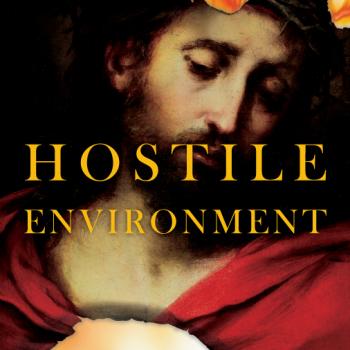Some people have talked about the conflict within the Republican party since the election of President Trump. Others have discussed the conflict in the Democrat party as well. But you may not have yet picked up on a conflict that is occurring among conservative Christians since the election of Trump. One thing Trump seems to be good for is promoting conflict.
To be fair, I cannot say that Trump is the ultimate source of all of this conflict. A fairer statement is that his presence has motivated the different elements in each of these groups to engage in this conflict. In other words, the seeds of the conflict were already there. Trump was just the water they needed to bloom. This is certainly the case for conservative Christians as there has been an ongoing struggle in this community over the proper role of Christians in politics. And that conflict has gotten nasty at times.
I am not as concerned about the conflict among Republicans and Democrats as I am among my fellow conservative Christians. That, and not politics, is where my identity lies. On one side of the Christian conflict are those who are supporters of President Trump and politicians like Roy Moore. Among these are individuals such as Mike Huckabee, Robert Jeffress, and Jerry Farwell Jr. On the other side are detractors of those types of Republican politicians. I would place David French, Rod Dreher and Bruce Ashford in this camp.
Note that individuals in both of these groups largely agree on most of the social and political issues of the day. They are pro-life, oppose notions of modern sexuality, want to fight for religious freedom, and promote a conservative religious theological framework. They do not disagree on which issues are important nor on the degree of importance of those issues. Where they do disagree is the value of someone like Trump or Moore. In this their differences are irreconcilable.
The difference between the two groups is not merely whether they are willing to support Trump/Moore or not. That decision undergirds a deep division in how each group sees the problems they want address and who they want to address them. For simplicity sake, I will refer to each group as either Trump supporters or Trump critics. But understand that the differences between these two groups go far beyond this one decision.
For example, the Trump supporters are concerned about the direction of our society under the Obama administration. They fear for the loss of our Christian culture and of religious freedom. Last year they feared that a Clinton presidency would finish the job Obama started as it concerned, in their opinion, ruining our Christian society. They also feel threatened by the anti-Christian hostility that has become more prominent and powerful over the past few years.
With such concerns and fears, these individuals are willing to “fight fire with fire.” In other words, they believe that their opponents are ruthless and will stop at almost nothing to promote an agenda depriving them of their religious freedom and setting up a society that displaces them. If that means supporting someone like Trump, who they generally acknowledge is not a highly moral person, then they are willing to take that step. When Moore comes along with all of the baggage (If you are unconvinced about how unfit Moore was for office then perhaps David French can convince you) he brings, the question for them is whether Moore is a solid vote for their causes. Other issues for which some may disqualify him as a candidate are not as important as getting that vote. Thus, for them the end justifies the means.
The Trump critics have many of the same concerns as the supporters. They fear for the loss of our Christian culture, of religious freedom, a Clinton presidency that would amplify the damage they saw in the Obama administration and the anti-Christian hostility that has become more prominent and powerful over the past few years. They also want to see a Senate that will support religious freedom and promote a pro-life agenda. When you read the writing of these critics, it becomes clear that they are realistic about the challenges conservative Christian face in a post-Christian world.
But Trump critics do not take the same approach as Trump supporters since they also fear the loss of our Christian identity. They believe that supporting politicians like Trump and Moore will rob our faith of the legitimacy that we need to have an authentic voice in our society. They reason that if we support immoral individuals in order to maintain a Christian society, and thus compromise our values, then we may not have a Christian society when we are done. Even if their political opponents are using unfair strategies to promote ideas they find distasteful, they are unwilling to utilize those strategies themselves. For them there is something inherently embedded in their Christian faith that they want to preserve even if they fear a loss of Christian rights.
The Trump supporters are angry at the Trump critics because they feel that those critics should support shared political goals. For example, some of them are mad at Christians who would not support the candidacy of Moore. On the other hand, Trump critics are angry at Trump supporters because they see such support producing a corrupt image of their faith. They fear that such an image will hamper their efforts to influence the larger culture and to promote the Christian faith. If you want to read a representation of some of these differences, then check out this debate between David French and John Zmirak on the pages of the New York Times.
One point of clarity. When I talk about ends justifying the means, I do not want to paint a drastic all or nothing picture. If for some awful reason Christianophobes attempted to pass a law allowing the murder of Christians (not that I think that there is any reason that there is support for such a law but the extreme example makes the point), I do not think that the supporters would look to kill their political opponents. On the other hand, the critics do not sit on their hands and refuse to engage in political battle with their political opponents. We are talking about degrees to which each side is willing to use relatively extreme means to accomplish their goals. Let’s be careful not to use hyperbole in describing those with whom we disagree.
I have done my best to fairly represent the ideas of both sides of this divide. But clearly I identify with the latter group more than the former group (although I am more politically moderate then either group). So I am an active participant in it. Nevertheless, I will attempt to offer an analysis of the implications and future of this division.
The recent Alabama Senate race brought out some of the animosity in this conflict. Some Trump supporters believe that those who do not support candidates such as Moore are allowing babies to die in abortion mills. Some Trump critics lament what support for the likes of Moore is doing to our Christian witness and how it affects our ability to impact our culture. The argument did not end with the electoral defeat of Moore. I fear it may intensify.
Despite the fact that I have a rooting interest in this fight, let me speculate what I think will happen over time. Of course no one is going to perfectly predict what occurs in a social conflict. But I see clues suggesting the most likely outcome of this conflict.
In the short term, the Trump supporters have the majority of influence and power among conservative Christians. Their man, Trump, has won and is President of the United States. They can parade judicial appointments and an administration that is overturning some of the excesses of the Obama administration. In their mind, American Christianity has been saved and their support of an imperfect vessel such as Trump is a big reason why it has been saved. Everybody likes a winner, and for right now the Trump supporters have won.
But I believe that this will be a short lived victory. Nothing in Trump’s past suggests that he will be able to achieve the long-term political victories that his allies crave. It seems likely that he will revert to a more politically progressive stance on key issues to achieve political victories or his incompetence will result in a dysfunctional administration. Either way I fear that the euphoria many supporters have today will give way to disappointment tomorrow.
This means that in the long run I think that the Trump critics will gain the upper hand in the fight. When Trump is discredited in the eyes of Christian conservatives, or leads those Christians to electoral defeat, then Trump will no longer be a winner, and the fortunes of those who support him will change. Furthermore, younger evangelicals are more likely to be part of the Trump critics, and over time they will have more influence among conservative Christians. At that point there will be more willingness to listen to Trump critics. Perhaps then conservative Christians will move away from their “win at all costs” mentality. The Moore defeat may be the first move in that direction.
Will Trump critics win with enough time to salvage an effort to shape American culture? I do not know how long we can forget about our values and principles and still have something left to offer to others. Can we recover from the cultural effects of supporting immoral politicians if Christians stop supporting them in 2018? What about in 2020? There is no certain answer to this. It is also possible that if Trump is discredited, then the way he is discredited may continue to be a stain on our Christian image. So no matter how soon Christians abandon Trump, the damage may have already been done.
It is possible that this divide will lead to a larger, more permanent divide among conservative Christians. When the Trump supporters lose power, they may want to ostracize Trump critics. I do not want to see that divide. In a post-Christian society we need to stick together as much as possible. But being a Trump critic, there is a limit to what I will do for Christian unity.
Remember that this divide is larger than Trump or Moore. It is about our willingness to compromise our principles for political power. We have compromised our principles long enough. In time we must regain the principles we have given up and reject political leaders not worthy of support. But it is also time to consider who we are as Christian people and to know that while we must engage in politics, there must be limitations on what we will do to obtain power. If we are as power hungry as the rest of society, then how is our faith making us the new creatures we claim to be.
















